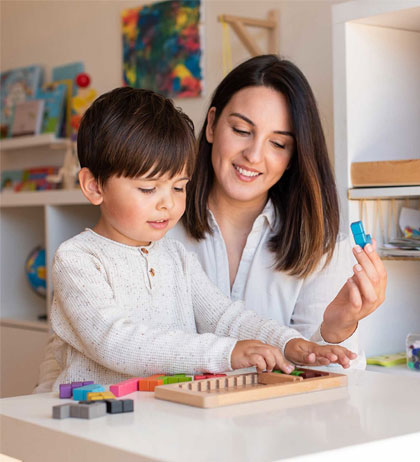A Holistic Approach
Empowering Special Children Through Occupational Therapy
Occupational therapy is particularly valuable for children with various physical, cognitive, sensory, or emotional impairments. The ultimate goal is to facilitate a child’s engagement in activities that are meaningful and purposeful, fostering their independence and enhancing their quality of life.

Key Components of Occupational Therapy for Special Children:
Assessment and Individualized Planning: Occupational therapists conduct thorough assessments to understand a child’s strengths, challenges, and developmental needs. Based on this assessment, they create personalized intervention plans, considering the child’s unique abilities and goals.
Sensory Integration Therapy: Many special children experience difficulties in processing sensory information. Occupational therapists employ sensory integration therapy to help children regulate their responses to stimuli, promoting improved attention, coordination, and behavior.
Fine and Gross Motor Skill Development: Occupational therapy aims to enhance a child’s motor skills, including both fine and gross motor abilities. Activities focusing on hand-eye coordination, balance, and body awareness contribute to the development of essential motor skills.
Social Skills and Emotional Regulation: Occupational therapists work on improving a child’s social interactions and emotional regulation. Through structured activities and play therapy, special children learn to express themselves, understand social cues, and build relationships with peers.
Adaptive Techniques and Assistive Devices: Occupational therapists may introduce adaptive techniques and recommend assistive devices to facilitate a child’s independence in daily activities. This can include modified utensils, adaptive computer technology, or specialized seating arrangements.
Collaboration with Parents and Caregivers: Occupational therapists collaborate closely with parents and caregivers, providing them with strategies and tools to support their child’s development at home. This partnership is essential for creating a consistent and enriching environment for the child.
Benefits of Occupational Therapy for Special Children:
Enhanced Independence: Occupational therapy empowers special children to perform daily tasks independently, boosting their confidence and self-esteem.
Improved Academic Performance: By addressing underlying challenges, occupational therapy can positively impact a child’s academic performance, enabling them to participate more effectively in educational activities.
Increased Social Participation: Special children often face social challenges. Occupational therapy fosters social skills, helping children engage with peers and form meaningful connections.
Enhanced Quality of Life: Through targeted interventions, occupational therapy contributes to an improved overall quality of life for special children and their families.
